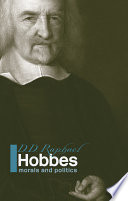 | Thomas Hobbes - 2002 - 664 pages
...former being still but the way to the latter. The cause whereof is that the object of man's desire is not to enjoy once only and for one instant of time, but to assure forever the way of his future desire. And therefore the voluntary actions and inclinations of all men... | |
 | Cynthia Halpern - 2002 - 338 pages
...greatest good, as is spoken of in the books of the old moral philosophers . . . [concerning] these qualities of mankind that concern their living together in peace and unity." Men do not live together in peace and unity: I put for a general inclination of all mankind, a perpetual... | |
 | David Daiches Raphael - 2003 - 116 pages
...the desire, from one object to another . . . The cause whereof is, that the object of man's desire, is not to enjoy once only, and for one instant of...to assure for ever, the way of his future desire. . . . So that in the first place, I put for a general inclination of all mankind, a perpetual and restless... | |
 | Jenny Davidson - 2004 - 256 pages
...should wash his mouth, or pick his teeth before company, and such other points of the Small Moralls; But those qualities of mankind, that concern their living together in Peace, and Unity."21 His tone here is that of one simply concerned to clarify the sense of an important word in... | |
 | Moth Stygermeer - 2005 - 172 pages
...way to the later. The cause whereof is, That the object of mans desire, is not to enjoy once onely, and for one instant of time; but to assure for ever, the way of future desire [...] So that in the first place, I put for a generall inclination of all mankind, a... | |
 | Thomas Hobbes - 2005 - 404 pages
...by mouth, or pick his teeth before company, and such other points of manners. the small morals, but those qualities of mankind that concern their living together in peace and unity. 1 To which end we are to consider that the felicity of this üfe consisteth not in the repose of a... | |
 | Victoria Kahn, Neil Saccamano, Daniela Coli - 2009 - 321 pages
...obtain pleasure. "The cause whereof is," he explains in Leviathan, "that the object of man's desire, is not to enjoy once only, and for one instant of time; but to assure for ever the way of his future desire."48 Just because happiness is the certainty of being able to continue to desire and to hope... | |
 | David Carl - 2006 - 330 pages
...former being still but the way to the latter. The cause whereof is that the object of man's desire is not to enjoy once only, and for one instant of time, but to assure forever the way of his future desire. And therefore the voluntary actions and inclinations of all men... | |
 | Karin Westerwelle - 2007 - 272 pages
...former, being still but the way to the latter. The cause whereof is, that the object of man's desire, is not to enjoy once only, and for one instant of...to assure for ever, the way of his future desire. And therefore the voluntary actions, and inclmations of all men, tend, not only to the procuring, but... | |
 | Douglas Kries - 2007 - 222 pages
...way to the later. The cause whereof is, That the object of mans desire, is not to enjoy once onely, and for one instant of time; but to assure for ever, the way of his future desire."12 Aristotle's supreme good and Thomas's last end imply that human desire comes to a resting... | |
| |